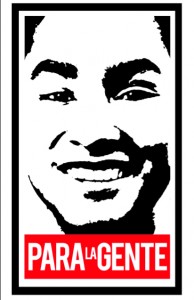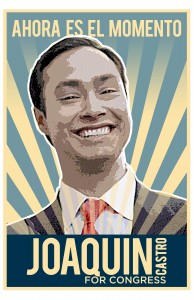Castro’s Campaign Will Inspire A New Generation Of Latino Leaders
 Austin, Texas — Last week I helped organize a meet-and-greet for Joaquín Castro in East Austin that brought a full spectrum of over 200 reporters, politicos, activists, academics, entrepreneurs, community leaders, neighborhood families and currently enrolled students together who were galvanized by his commitment to represent Central Texas in Washington, D.C. I brought Zach, one of my mentees, along for this meet-and-greet at the iconic Juan In A Million restaurant to observe the preparations, interviews and politicking that were sure to unfold before and after the event.
Austin, Texas — Last week I helped organize a meet-and-greet for Joaquín Castro in East Austin that brought a full spectrum of over 200 reporters, politicos, activists, academics, entrepreneurs, community leaders, neighborhood families and currently enrolled students together who were galvanized by his commitment to represent Central Texas in Washington, D.C. I brought Zach, one of my mentees, along for this meet-and-greet at the iconic Juan In A Million restaurant to observe the preparations, interviews and politicking that were sure to unfold before and after the event.
From my perspective, Congressional District 35 positions Joaquín Castro to be the first Latino leader who could link the predominantly Latino enclaves between east Austin and central San Antonio together since the way Juan Seguín himself once did over a century and a half ago. Congressional District 35 combines six central Texas counties that contain rapidly growing Latino populations, particularly high concentrations of young voters distributed across high schools and institutions of higher education throughout Bexar, Caldwell, Comal, Guadalupe, Hays and Travis counties.
Castro seems uniquely positioned to be the candidate this new district needs.
It was very moving to see so many young people who traveled from far away because they were inspired by his vision. After speaking to him, I believe his campaign will inspire a new generation of young Latinos and Latinas to not only vote in the upcoming election — but to also respond to the call of leadership, as he and his brother did at such an early age. Listening to him, it’s clear his motivation was encouraged by his family and that he draws tremendous strength from their love and support. Enhancing an “infrastructure of opportunity” so that all residents, Latino and non-Latino alike, can achieve the American Dream seems directly derived from conversations at the dinner table with his mother and brother. His personal stories about his family’s struggles and accomplishments reminded us all of our parents’ and grandparents’ experiences with institutionalized discrimination in Texas.
When he addressed the crowd, I saw excitement and hope among the faces of most in attendance that was reminiscent of the latter days of the 2008 Obama campaign. The crowd dissipated in East Austin as the sun set in the west, and it was obvious to me that the hybrid-Latino-grassroots support that Castro is galvanizing will serve the Democratic Party during the 2012 presidential election, and beyond. For east Austin residents in particular, improving educational outcomes for majority Latino schools and increasing access to greater economic opportunities for historically under-served populations are priorities. Part of the solution is tapping into local talent and the energy of organized networks of families, neighborhoods and small business owners. Castro is already gaining momentum across these key sectors, like the community organizers, and the potential youth Latino vote comprised of high school seniors and currently enrolled college students will definitely secure his victory.
Perhaps the most fascinating part of this congressional campaign is how easy it is for young Latinos to relate to Joaquín Castro and to believe that they, too, can apply their talents to improve the future of Texas for the benefit of us all.
Joseph P. A. Villescas, Ph.D. is an independent consultant, writer and instructor. He conducts extensive investigations on Latino and other multidimensional populations that explore trends in their educational development, media consumption, internet usage, voting behaviors, racial categorization, organizational capacities and readiness for future leadership roles in community settings. He is also the founder and owner of Villescas Research, Media & Instruction, LLC.



